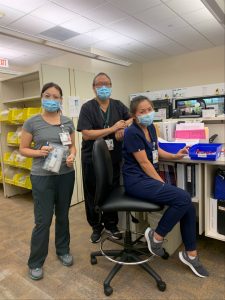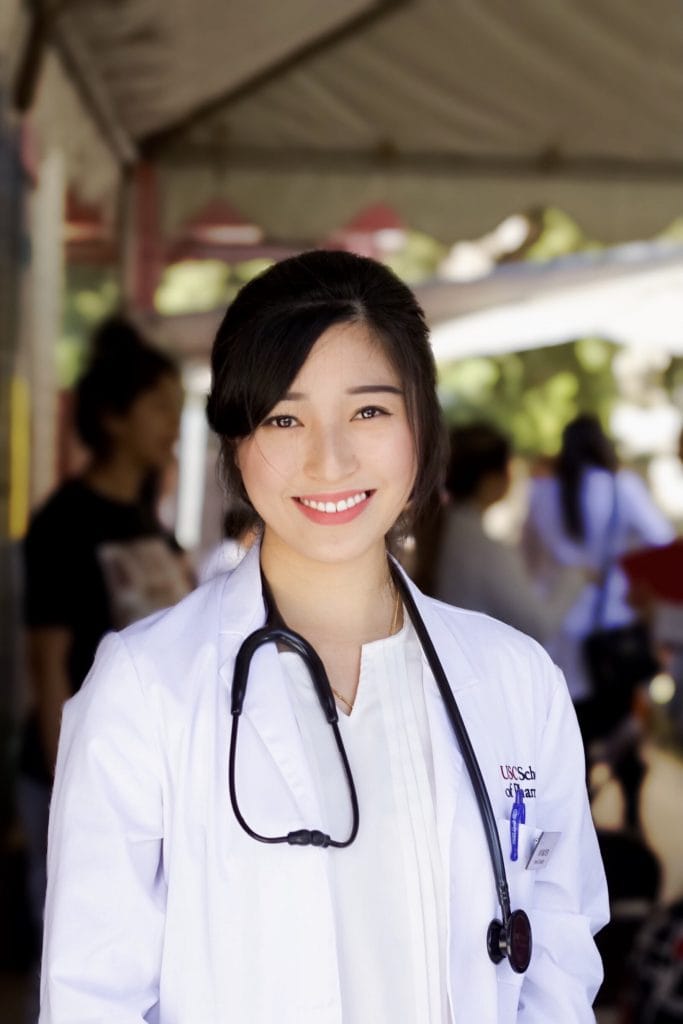During a telephone medication review, the elderly patient confessed in Vietnamese to Vivi Nguyen, PharmD Class of 2023, that she had stopped taking her hypertension medicine. “A lot of Asians are hesitant to take their medications for fear of side effects,” Nguyen says. “She thought that walking every day would be sufficient.”
Nguyen’s cultural awareness and their shared language enabled her to convince the woman to follow her prescriptions. The other major factor, of course, is her growing expertise in medication management—along with all other aspects of her chosen field—built through the PharmD coursework and such programs as the Introductory Pharmacy Practice Experience (IPPE).
While COVID-19 has triggered protective measures that include shifting more courses online, USC School of Pharmacy students continue serving the public while honing their clinical skills. They just fulfill their duties remotely or by using personal protective equipment (PPE) and maintaining physical-distancing guidelines.
Virtual Service, Real Care
Nguyen conducted her most recent IPPE rotation through the USC Virtual Pharmacist Care Center, which provides remote comprehensive medication management services for high-risk patients.
“Our program improves quality of care and reduces total healthcare costs,” says Jessica Abraham, PharmD, director of population health at the school. Nguyen’s work with the center, for instance, “included creating internal workflows to standardize and improve processes, assessment reporting for quality improvement initiatives, and patient interactions to provide adherence assessments and comprehensive medication reviews,” Abraham explains.
But the PharmD candidate went well above her assignment, Abraham adds. “She took the extra steps to use her Vietnamese background to help enhance the cultural sensitivity of our center.” As a result, patients “trusted her and confided in her, which allowed her to improve their care,” she says.
Even though her 10-day rotation has ended, Nguyen still volunteers at the center to help bridge cultural gaps in addressing the medication management needs of Vietnamese patients.
Foundation for Success
The Virtual Pharmacist Care Center is just one of many options available to School of Pharmacy students for their IPPE service. Even during the pandemic, IPPEs involve hands-on training from more than 400 preceptors at nearly 300 partnering sites.

“We make sure students are protecting themselves with PPE, but we don’t cancel rotations during COVID-19,” says Jane Liu, a clinical pharmacist and preceptor at Huntington Hospital—one of the school’s many partners.
Huntington Hospital has been training USC students and residents since the early 1980s and exposes IPPE and Advanced Pharmacy Practice Experiences (APPE) students to a wide range of disciplines, including pediatrics, infectious diseases, anticoagulation, emergency room, general medicine, critical care and informatics.
“Huntington has a great reputation and a long history of knowing how to integrate IPPEs, APPEs and residents into their clinical services through a layered learning teaching model,” says Ying Wang, director of professional experience programs at USC Mann. “Their team has mastered the ability to organize rotations for learners of all levels and include opportunities for them to interact and learn from each other under the guidance of an experienced preceptor.”
This teaching approach allows IPPE students to gain experience by performing important duties from day one. These range from dispensing and compounding as first-year students to serving in more clinical roles when further along in their studies.
Learning by Doing
“I learned how to really apply the clinical information I had learned from my therapeutic modules in a hospital setting,” says PharmD Class of 2021 student Nikan Rassooli, who completed his IPPE rotation at Huntington Hospital in March 2020. “Looking through patient charts, observing lab values, individualizing antibiotic and anticoagulant regimens, I gained an appreciation for how important it was to continue educating myself in these key clinical areas, reinforcing the idea that pharmacy education is a lifelong commitment.”
Students complete a minimum of 300 hours of experiential learning in their first three years of the PharmD program. By the time they earn their degree, they will have racked up a minimum of 1,740 hours of experiential learning.
PharmD Class of 2023 student Amanda Pan’s IPPE rotation at the hospital began in April 2020 after COVID-19 measures were put in place. Pan wasn’t able to shadow clinical pharmacists on the hospital floors due to new policies to protect student pharmacists during their training. Still, she credits her experience at Huntington Hospital for preparing her for her current hospital internship at the Los Angeles County+USC Medical Center.
“I got to learn about the medications used more often in a hospital setting compared to a community setting,” Pan says. “Training in a hospital setting during the pandemic, I also learned about the increased use of some specific medications to treat COVID-19 patients.”
Pan’s preceptor, Fred Mock, mentors IPPE participants and was selected by School of Pharmacy PharmD students as the 2019–2020 Most Knowledgeable Preceptor. A pharmacist for almost 40 years, he precepts 12 students a year and enjoys working with USC students because “they’re motivated, consistent and eager to learn.”
Mock emphasizes letting IPPE students see the entire operation, from shadowing technicians and dispensing to interacting with pharmacists from different disciplines. “I might be teaching my replacement, so I better make sure they’re well trained,” he quips.


